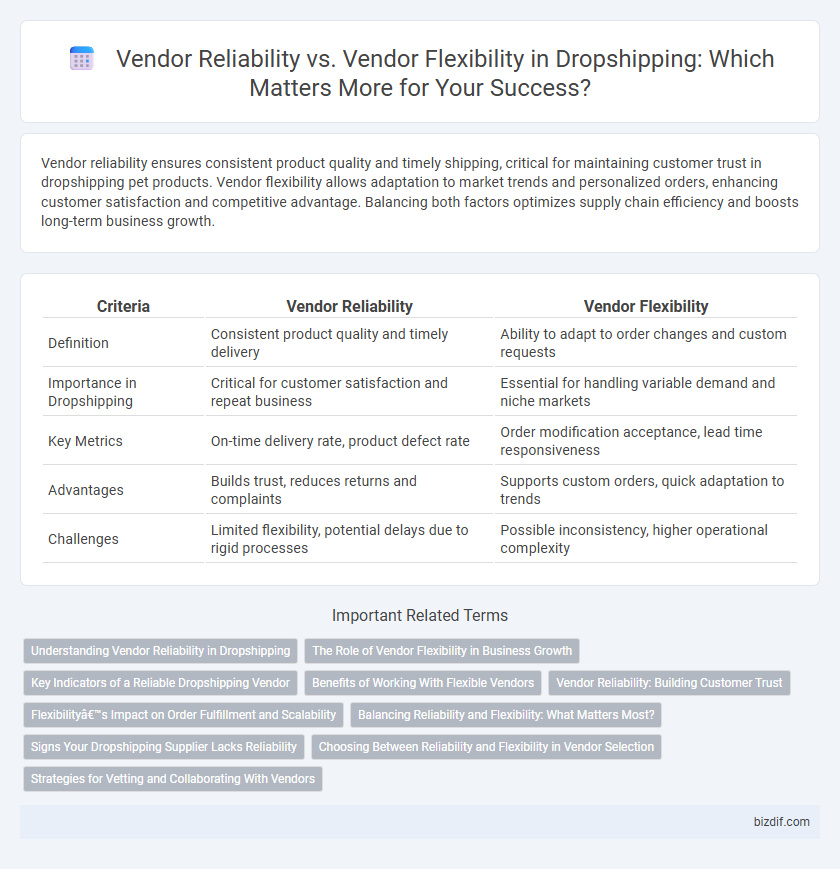Vendor reliability ensures consistent product quality and timely shipping, critical for maintaining customer trust in dropshipping pet products. Vendor flexibility allows adaptation to market trends and personalized orders, enhancing customer satisfaction and competitive advantage. Balancing both factors optimizes supply chain efficiency and boosts long-term business growth.
Table of Comparison
| Criteria | Vendor Reliability | Vendor Flexibility |
|---|---|---|
| Definition | Consistent product quality and timely delivery | Ability to adapt to order changes and custom requests |
| Importance in Dropshipping | Critical for customer satisfaction and repeat business | Essential for handling variable demand and niche markets |
| Key Metrics | On-time delivery rate, product defect rate | Order modification acceptance, lead time responsiveness |
| Advantages | Builds trust, reduces returns and complaints | Supports custom orders, quick adaptation to trends |
| Challenges | Limited flexibility, potential delays due to rigid processes | Possible inconsistency, higher operational complexity |
Understanding Vendor Reliability in Dropshipping
Vendor reliability in dropshipping is crucial for ensuring consistent product quality, timely order fulfillment, and accurate inventory management, directly impacting customer satisfaction. Reliable vendors minimize shipment delays and reduce the risk of order cancellations, which helps maintain a positive brand reputation and lowers return rates. Evaluating vendor reliability involves analyzing performance metrics such as delivery speed, product accuracy, and communication responsiveness to select partners that support scalable business growth.
The Role of Vendor Flexibility in Business Growth
Vendor flexibility directly impacts business growth by enabling rapid adaptation to market changes, customized product offerings, and responsive inventory management. Reliable vendors ensure consistent product quality and timely deliveries, but flexibility allows businesses to capitalize on emerging trends and customer preferences. Balancing vendor reliability with flexibility fosters resilience and scalability in dropshipping operations.
Key Indicators of a Reliable Dropshipping Vendor
Key indicators of a reliable dropshipping vendor include consistent order fulfillment rates above 95%, transparent communication channels, and positive customer feedback ratings exceeding 4.5 stars. Reliable vendors maintain accurate inventory levels in real-time to prevent stockouts and ensure timely delivery within 3-7 business days. Vendor flexibility is secondary to reliability, as dependable supply chain operations and adherence to agreed-upon service level agreements (SLAs) drive long-term business success.
Benefits of Working With Flexible Vendors
Working with flexible vendors in dropshipping enhances the ability to quickly adapt to market changes and customer demands, ensuring a dynamic inventory and faster product updates. Flexible vendors often offer customizable order quantities, diverse product options, and seamless integration with e-commerce platforms, improving operational efficiency. This adaptability reduces risks associated with stock shortages and enables scalable business growth, contributing to higher customer satisfaction and retention rates.
Vendor Reliability: Building Customer Trust
Vendor reliability in dropshipping directly impacts customer trust by ensuring consistent product quality and timely delivery. Reliable vendors minimize order errors and shipping delays, which leads to higher customer satisfaction and repeat business. Establishing a dependable supply chain fosters brand loyalty and strengthens overall business reputation.
Flexibility’s Impact on Order Fulfillment and Scalability
Vendor flexibility plays a critical role in order fulfillment by enabling rapid adjustments to inventory, shipping methods, and product variations, thus reducing delays and enhancing customer satisfaction. Unlike strict vendor reliability, flexibility supports scalability by accommodating fluctuating demand and market trends without compromising service quality. E-commerce businesses leveraging flexible suppliers experience smoother scaling processes and improved adaptability in competitive dropshipping environments.
Balancing Reliability and Flexibility: What Matters Most?
Balancing vendor reliability and vendor flexibility is crucial for dropshipping success, as reliable vendors ensure consistent product quality and timely delivery, which directly impact customer satisfaction and retention. Vendor flexibility allows quick adaptation to market changes, such as fluctuating demand and product trends, enabling businesses to diversify offerings and avoid stockouts. Prioritizing a vendor that combines dependable fulfillment with adaptability optimizes operational efficiency and enhances competitive advantage in the dynamic e-commerce landscape.
Signs Your Dropshipping Supplier Lacks Reliability
Frequent order delays, inconsistent product quality, and poor communication are key indicators that your dropshipping supplier lacks reliability. Unreliable vendors can disrupt your fulfillment process, leading to negative customer experiences and increased chargebacks. Consistent reliability in order processing and shipment tracking is essential for maintaining customer trust and business growth in dropshipping.
Choosing Between Reliability and Flexibility in Vendor Selection
Prioritizing vendor reliability ensures consistent product quality and timely order fulfillment, which builds customer trust and reduces return rates in dropshipping. Vendor flexibility allows adaptation to market changes and customization in product offerings, supporting niche targeting and dynamic inventory management. Balancing reliability and flexibility optimizes supply chain stability while enabling responsiveness to evolving consumer demands.
Strategies for Vetting and Collaborating With Vendors
Effective dropshipping strategies prioritize vendor reliability by thoroughly vetting suppliers through metrics such as fulfillment rates, shipping times, and customer reviews to ensure consistent product delivery. Evaluating vendor flexibility involves assessing their willingness to accommodate inventory fluctuations, custom packaging, and responsive communication, which enhances adaptability to market changes. Combining these criteria enables sellers to establish strong partnerships, optimizing supply chain efficiency and customer satisfaction.
Vendor Reliability vs Vendor Flexibility Infographic

 bizdif.com
bizdif.com